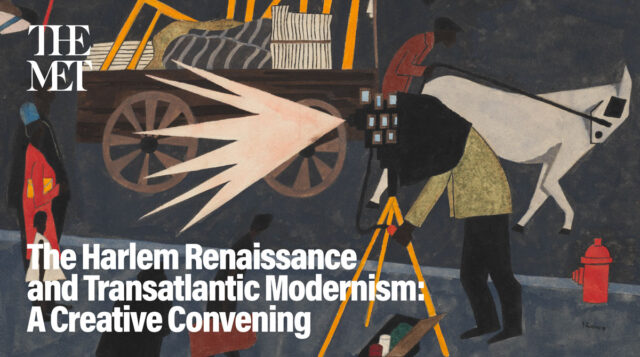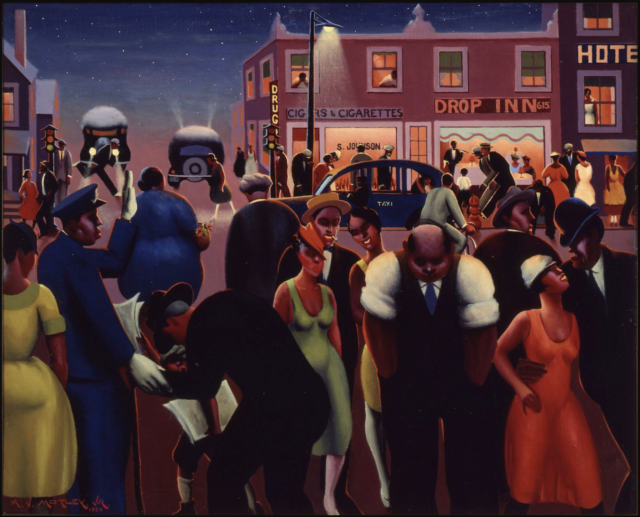
Who: Jordan Casteel, Joy Bivins, Rhea L. Combs, Thelma Golden, Tayari Jones, Christopher McBride, Tayari Jones, NSangou Njikam, Denise Murrell, more
What: All-day symposium with lectures, conversations, and performances
Where: The Grace Rainey Rogers Auditorium, the Met Fifth Ave., 1000 Fifth Ave. at Eighty-Second St.
When: Saturday, April 27, free with RSVP, 10:00 am – 6:00 pm
Why: The exhibit of the year thus far is the Met’s “The Harlem Renaissance and Transatlantic Modernism,” an eye-opening collection of more than 160 paintings, sculptures, photographs, films, and ephemera from the “New Negro” movement in Harlem between the 1920s and 1940s. Featuring works by Horace Pippin, Charles Alston, Aaron Douglas, Jacob Lawrence, William H. Johnson, Winold Reiss, Augusta Savage, Hale Woodruff, James Van Der Zee, and others — alongside pieces by Henri Matisse, Edvard Munch, Chaim Soutine, Pablo Picasso, and more to provide context — the show is divided into such sections as “The Thinkers,” “Everyday Life in the New Black Cities,” “Portraiture and the Modern Black Subject,” “Debate and Synthesis: African and Western Aesthetics,” “A Language of Artistic Freedom,” “Cultural Philosophy and History Painting,” “European Modernism and the International African Diaspora,” “Luminaries,” “Nightlife,” “Family and Society,” and “Artist and Activist.”
On April 27, the Met will host “The Harlem Renaissance and Transatlantic Modernism: A Creative Convening,” a free, all-day symposium consisting of live performances, lectures, and conversations with an outstanding lineup of artists, authors, educators, curators, museum directors, and other experts. The full schedule is below.
“Art must discover and reveal the beauty which prejudice and caricature have obscured and overlaid,” Alain Locke, who is featured prominently in the exhibition, explained in The New Negro in 1925. “All vital art discovers beauty and opens our eyes to beauty that previously we could not see.”
The revelation of the show is the little-known Archibald J. Motley Jr., a painter of extraordinary quality who immerses visitors in his dramatic scenes bursting with life; among his striking canvases on view are Jockey Club, Dans la rue, Blues, Cocktails, and Black Belt. He even gets his own section, “The New Negro Artist Abroad: Motley in Paris.”

Archibald J. Motley Jr., Black Belt, oil on canvas, 1934 (Hampton University Museum / courtesy the Chicago History Museum. © Valerie Gerrard Browne)
“We younger Negro artists who create now intend to express our individual dark-skinned selves without fear or shame. If white people are pleased we are glad. If they are not, it doesn’t matter. We know we are beautiful. And ugly too,” Langston Hughes wrote in 1926. “If colored people are pleased we are glad. If they are not, their displeasure doesn’t matter either. We build our temples for tomorrow, strong as we know how, and we stand on top of the mountain, free within ourselves.”
Be sure not to miss the final room, which contains Romare Bearden’s monumental 1971 six-panel Harlem tribute The Block, its own temple for tomorrow.
Saturday, April 27
Opening Performance: The National Jazz Museum in Harlem House Band led by Christopher McBride, 10:00
Welcome and Introduction, with Max Hollein, Heidi Holder, and Denise Murrell, 10:35
Keynote, by Isabel Wilkerson, 10:45
Session I
Presentations: Harlem as Nexus, with Emilie Boone, Rhea L. Combs, Ego Ahaiwe Sowinski, and Richard J. Powell, 11:30
Session II
Conversation: Legacies of Harlem on My Mind, with Bridget R. Cooks and Lowery Stokes Sims (virtually), moderated by Denise Murrell, 2:00
Conversation: Visioning the Future — The Collections of Historically Black Colleges and Universities, with Kathryn E. Coney, Jamaal Sheats, Danille Taylor, and Vanessa Thaxton-Ward, moderated by Joy Bivins, 3:00
Session III
Conversation: New Renaissance — Harlem Today, with Jordan Casteel, Anna Glass, and Sade Lythcott, moderated by Thelma Golden, 4:30
Reading, by NSangou Njikam, 5:30
Closing Remarks, by Denise Murrell, 5:45